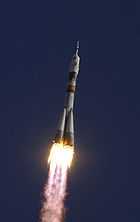Soyuz-M
Soyuz-M
| Function |
Carrier rocket |
| Manufacturer |
OKB-1 |
| Country of origin |
Soviet Union |
| Size |
| Height |
50 metres (160 ft) |
| Diameter |
10.3 metres (34 ft) |
| Mass |
300,000 kilograms (660,000 lb) |
| Stages |
Two |
| Capacity |
Payload to
LEO |
6,600 kilograms (14,600 lb) |
| Associated rockets |
| Family |
R-7 |
| Launch history |
| Status |
Retired |
| Launch sites |
Plesetsk Cosmodrome |
| Total launches |
8 |
| Successes |
8 |
| First flight |
27 December 1971 |
| Last flight |
31 March 1976 |
| Notable payloads |
Zenit-4MT |
The Soyuz-M (Russian: Союз, meaning "Union"), GRAU index 11A511M was a Soviet expendable carrier rocket designed by OKB-1 and manufactured by State Aviation Plant No. 1 in Samara, Russia. It was originally built to launch manned Soyuz 7K-VI spacecraft for the Soviet armed forces. Following the cancellation of this programme, development of the rocket continued for the Soyuz 7K-S spacecraft. After this too was cancelled, Soyuz-M development was also abandoned, and the rockets that had been completed were used to launch reconnaissance satellites.
While the exact details of the Soyuz-M are not known, it is believed to be a two-stage rocket, derived from the Soyuz. It may have been similar to the later Soyuz-U.[1] Following the cancellation of the Soyuz 7K-S, eight were launched with Zenit-4MT spacecraft.[1] The first of these launches occurred on 27 December 1971, and the last on 31 March 1976. All launches occurred from the Plesetsk Cosmodrome, the first used Site 43/4, however the sites used by the subsequent launches were not recorded.
References
- ↑ 1.0 1.1 Wade, Mark. "Soyuz". Encyclopedia Astronautica. Retrieved 2009-04-16.
|
|---|
| | Active | |
|---|
| | In development | |
|---|
| | Former | |
|---|
|
|
|---|
| | Main articles | | |
|---|
| | Rockets | |
|---|
| | Launch sites | |
|---|
| | Launches | |
|---|
| | See also | |
|---|
|
